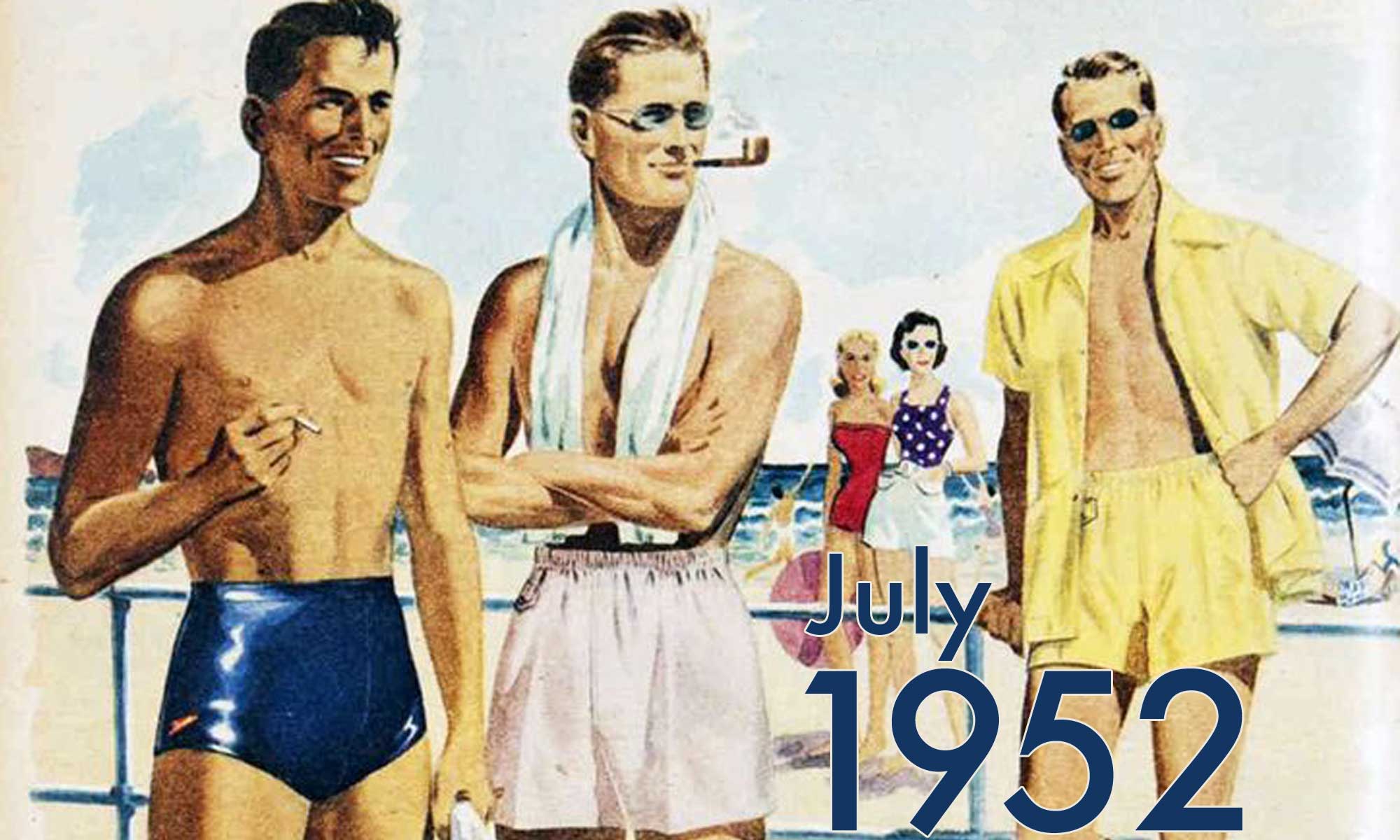| ◄ JULY ► | ||||||
|---|---|---|---|---|---|---|
| ◄ 1952 ► | ||||||
| 1 | 2 | 3 | 4 | 5 | ||
| 6 | 7 | 8 | 9 | 10 | 11 | 12 |
| 13 | 14 | 15 | 16 | 17 | 18 | 19 |
| 20 | 21 | 22 | 23 | 24 | 25 | 26 |
| 27 | 28 | 29 | 30 | 31 | ||
| President: | Harry S Truman (D) | |||
| Vice-President: | Alben W. Barkley (D) | |||
| House: | 230 (D) | 200 (R) | 1 (Other) | 4 (Vacant) |
| Southern states: | 102 (D) | 2 (R) | 1 (Vacant) | |
| Senate: | 50 (D) | 46 (R) | ||
| Southern states: | 22 (D) | |||
| GDP growth: | 5.3% | (Annual) | ||
| 3.3% | (Quarterly) | |||
| Inflation: | 1.9% | |||
| Unemployment: | 3.2% | |||
| US killed in action, | 593 | (This month) | ||
| Korean conflict: | 29,794 | (Since Jun 28, 1950) | ||
![]() Jul 3: The North Korean delegation at the peace talks in Pamunjom offer a proposal to break the deadlock on prisoner exchanges. The North’s new proposal calls for mandatory repatriation of all North Korean POWs in U.N. custody, but says that South Korean POWs who served in Communist forces may choose whether to be repatriated. The U.N. will reject the proposal.
Jul 3: The North Korean delegation at the peace talks in Pamunjom offer a proposal to break the deadlock on prisoner exchanges. The North’s new proposal calls for mandatory repatriation of all North Korean POWs in U.N. custody, but says that South Korean POWs who served in Communist forces may choose whether to be repatriated. The U.N. will reject the proposal.
![]() Jul 3: Sen. Joseph McCarthy (R-WI) attacks Sen. William Benton (D-CT) as “a clever propagandist worth millions a year” to the Communist party. He calls Benton “the chameleon from Connecticut” who surrounded himself with “a motley, red-tinted crowd” when he served as Assistant Secretary of State. McCarthy says he has not decided whether Benton was “a deliberate tool of the Communist party. … However, he is doing as much damage as though he were.” McCarthy had been speaking for five hours before a Senate Rules subcommittee considering McCarthy’s demand for a hearing into Benton’s conduct, and another resolution from Benton calling for McCarthy’s ouster. Benton accuses McCarthy of “Tactics of blackmail” and invited a test between the two under perjury laws.
Jul 3: Sen. Joseph McCarthy (R-WI) attacks Sen. William Benton (D-CT) as “a clever propagandist worth millions a year” to the Communist party. He calls Benton “the chameleon from Connecticut” who surrounded himself with “a motley, red-tinted crowd” when he served as Assistant Secretary of State. McCarthy says he has not decided whether Benton was “a deliberate tool of the Communist party. … However, he is doing as much damage as though he were.” McCarthy had been speaking for five hours before a Senate Rules subcommittee considering McCarthy’s demand for a hearing into Benton’s conduct, and another resolution from Benton calling for McCarthy’s ouster. Benton accuses McCarthy of “Tactics of blackmail” and invited a test between the two under perjury laws.
![]()
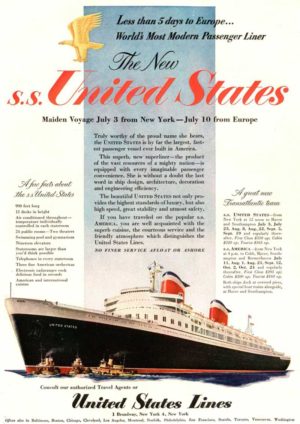 Jul 3-7: The ocean liner SS United States makes her maiden voyage, breaking a transatlantic speed record held by RMS Queen Mary. The United States completes the journey from New York to Bishop Rock, setting a transatlantic record in 3 days, ten hours and 40 minutes, at an average speed of 35.6 knots. The previous record was set in 1938 by the Queen Mary at 31.7 knots. The United States will arrive at her destination at Le Havre, France on July 7.
Jul 3-7: The ocean liner SS United States makes her maiden voyage, breaking a transatlantic speed record held by RMS Queen Mary. The United States completes the journey from New York to Bishop Rock, setting a transatlantic record in 3 days, ten hours and 40 minutes, at an average speed of 35.6 knots. The previous record was set in 1938 by the Queen Mary at 31.7 knots. The United States will arrive at her destination at Le Havre, France on July 7.
![]()
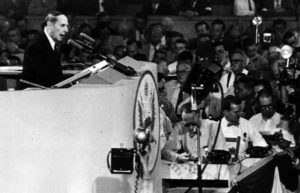 Jul 7: The Republican National Convention opens at the newly-built International Amphitheater in Chicago. It is the first convention to be nationally televised. The top two contenders for the presidential nomination are Ohio Senator Robert A. Taft and Gen. Dwight D. Eisenhower. They are neck and neck in the delegate count when the convention opens. Gen. Douglas MacArthur, who some are promoting for Vice President, is the first night’s keynote speaker. He electrifies the hall when he denounces the Democratic party as “captive to the schemers and planners who have infiltrated its ranks of leadership to set the national course unerringly toward the socialistic regimentation of a totalitarian state.” He calls Democrats “the war party” and blasts Truman’s conduct of the Korean War: “We must have leadership capable of decision, for indecision in war is but the prelude to disaster.”
Jul 7: The Republican National Convention opens at the newly-built International Amphitheater in Chicago. It is the first convention to be nationally televised. The top two contenders for the presidential nomination are Ohio Senator Robert A. Taft and Gen. Dwight D. Eisenhower. They are neck and neck in the delegate count when the convention opens. Gen. Douglas MacArthur, who some are promoting for Vice President, is the first night’s keynote speaker. He electrifies the hall when he denounces the Democratic party as “captive to the schemers and planners who have infiltrated its ranks of leadership to set the national course unerringly toward the socialistic regimentation of a totalitarian state.” He calls Democrats “the war party” and blasts Truman’s conduct of the Korean War: “We must have leadership capable of decision, for indecision in war is but the prelude to disaster.”
![]()
 Jul 8: Ohio Sen. Robert Taft takes an early advantage in the fight for the Republican presidential nomination when his backers take control of the Credentials Committee which seats a solid pro-Taft insurgent delegation from Georgia instead of the the regular delegation which favors Eisenhower. But Taft makes a tactical mistake by banning all reporters from the Credentials Committee meeting, giving rise to arguments that secret deals are being made in a proverbial smoke-filled room. Meanwhile, a separate fight over a civil rights plank in the GOP platform threatens to create a rift between northern and southern delegates.
Jul 8: Ohio Sen. Robert Taft takes an early advantage in the fight for the Republican presidential nomination when his backers take control of the Credentials Committee which seats a solid pro-Taft insurgent delegation from Georgia instead of the the regular delegation which favors Eisenhower. But Taft makes a tactical mistake by banning all reporters from the Credentials Committee meeting, giving rise to arguments that secret deals are being made in a proverbial smoke-filled room. Meanwhile, a separate fight over a civil rights plank in the GOP platform threatens to create a rift between northern and southern delegates.
![]()
 Jul 9: Gen. Eisenhower’s battle for delegates at the Republican National Convention shifts in his favor when, in a floor vote, the convention overturns the Credentials Committee’s decision to seat an insurgent Georgia delegation. The Credential Committee then yields on similar fights over the Texas and Louisiana delegations. But in an evening address before the convention and a national television audience, former President Herbert Hoover endorses Taft and deplores the acrimonious battle for delegates. “This convention meets not only to nominate a candidate, but to save America,” says Hoover. “I have been deeply distressed at the acrimonious discussion in the convention. I can only hope that that shall cease for the sake of the future of our party and the country.”
Jul 9: Gen. Eisenhower’s battle for delegates at the Republican National Convention shifts in his favor when, in a floor vote, the convention overturns the Credentials Committee’s decision to seat an insurgent Georgia delegation. The Credential Committee then yields on similar fights over the Texas and Louisiana delegations. But in an evening address before the convention and a national television audience, former President Herbert Hoover endorses Taft and deplores the acrimonious battle for delegates. “This convention meets not only to nominate a candidate, but to save America,” says Hoover. “I have been deeply distressed at the acrimonious discussion in the convention. I can only hope that that shall cease for the sake of the future of our party and the country.”
![]() Jul 10: The Republican National Convention quickly approves the party’s platform. The civil rights section pledges “good faith” efforts to end lynching, poll taxes, and legislation to “further just and equitable treatment in the area of discriminatory employment practices. Federal action should not duplicate state efforts to end such practices; should not set up another huge bureaucracy.” The platform also calls for an Equal Rights Amendment to the Constitution guaranteeing equal rights for men and women.
Jul 10: The Republican National Convention quickly approves the party’s platform. The civil rights section pledges “good faith” efforts to end lynching, poll taxes, and legislation to “further just and equitable treatment in the area of discriminatory employment practices. Federal action should not duplicate state efforts to end such practices; should not set up another huge bureaucracy.” The platform also calls for an Equal Rights Amendment to the Constitution guaranteeing equal rights for men and women.
![]()
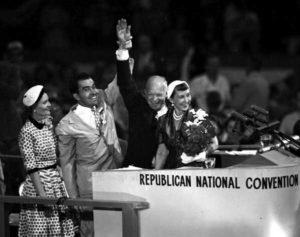 Jul 11: Gen. Dwight D. Eisenhower wins a very close first-ballot victory over Ohio Sen. Robert Taft for the Republican nomination for president. The first roll call has Eisenhower in the lead at 595 to Taft’s 500 (with California favorite son candidate Gov. Earl Warren getting 81, Minnesota favorite son and former Gov. Harold Stassen getting 20, and Gen. Douglas MacArthur, 10). With 604 votes required for nomination and weary delegates preparing for a second ballot, the Minnesota delegation announces that it is changing nineteen votes for Stassen to Eisenhower before the first ballot result can be announced. With Eisenhower now holding 614 votes, other states begin changing their votes in order to be recorded on the side the the winner. Eisenhower names California Sen. Richard M. Nixon as his running mate.
Jul 11: Gen. Dwight D. Eisenhower wins a very close first-ballot victory over Ohio Sen. Robert Taft for the Republican nomination for president. The first roll call has Eisenhower in the lead at 595 to Taft’s 500 (with California favorite son candidate Gov. Earl Warren getting 81, Minnesota favorite son and former Gov. Harold Stassen getting 20, and Gen. Douglas MacArthur, 10). With 604 votes required for nomination and weary delegates preparing for a second ballot, the Minnesota delegation announces that it is changing nineteen votes for Stassen to Eisenhower before the first ballot result can be announced. With Eisenhower now holding 614 votes, other states begin changing their votes in order to be recorded on the side the the winner. Eisenhower names California Sen. Richard M. Nixon as his running mate.
![]() Jul 12: Alllied aircraft pound the North Korean capital Pyongyang and the Communists’ military build-up in western Korea. It is described as one of the most devastating raids of the war. Some 1,200 sorties drop 600 toms of bombs on their targets. After nightfall, fifty-four B-29 Suprefortress bombers take off from Japan and Okinawa and pound Pyongyang. Another eleven B29s strike few other military targets in North Korea. Meanwhile, truce talks drag on in Panmunjom with no apparent progress towards an agreement.
Jul 12: Alllied aircraft pound the North Korean capital Pyongyang and the Communists’ military build-up in western Korea. It is described as one of the most devastating raids of the war. Some 1,200 sorties drop 600 toms of bombs on their targets. After nightfall, fifty-four B-29 Suprefortress bombers take off from Japan and Okinawa and pound Pyongyang. Another eleven B29s strike few other military targets in North Korea. Meanwhile, truce talks drag on in Panmunjom with no apparent progress towards an agreement.
![]() Jul 12: Vera Lynn’s single “Auf Wiederseh’n Sweetheart” begins its nine week run at number one.
Jul 12: Vera Lynn’s single “Auf Wiederseh’n Sweetheart” begins its nine week run at number one.
![]()
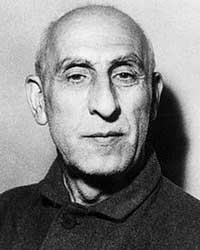 Jul 13: Iranian Prime Minister Mohammed Mossadegh appears before the Majlis and presents a single-article bill which would provide him with full legislatorial powers for the next six months. He seeks these powers “to formulate and implement plans for financial, economic, judicial, banking and personnel reforms.” Mossadegh says he needs complete freedom to rescue the nation from its current financial crisis stemming from his nationalization of the British-owned Anglo-Iranian Oil Company. Oil shipments have come to a virtual halt since June 1951.
Jul 13: Iranian Prime Minister Mohammed Mossadegh appears before the Majlis and presents a single-article bill which would provide him with full legislatorial powers for the next six months. He seeks these powers “to formulate and implement plans for financial, economic, judicial, banking and personnel reforms.” Mossadegh says he needs complete freedom to rescue the nation from its current financial crisis stemming from his nationalization of the British-owned Anglo-Iranian Oil Company. Oil shipments have come to a virtual halt since June 1951.
![]() Jul 17: The North Koreans announce the establishment of four new prisoner of war stockades in or near Pyongyang following the large-scale bombing of the North Korean capital the previous weekend.
Jul 17: The North Koreans announce the establishment of four new prisoner of war stockades in or near Pyongyang following the large-scale bombing of the North Korean capital the previous weekend.
![]() Jul 17: Iranian Prime Minister Mohammed Mossadegh abruptly resigns after Shah Mohammed Riza Pahlevi refuses to allow Mossadegh the right to appoint himself as War Minister. The right to appoint the Minister overseeing the poorly-equipped and undisciplined military represents the Shah’s last remaining authority. If the Majlis were to accede to Mossadegh’s demand for full legislatorial powers and the Shah gave in on control of the military, Mossadegh would have become an all-powerful dictator.
Jul 17: Iranian Prime Minister Mohammed Mossadegh abruptly resigns after Shah Mohammed Riza Pahlevi refuses to allow Mossadegh the right to appoint himself as War Minister. The right to appoint the Minister overseeing the poorly-equipped and undisciplined military represents the Shah’s last remaining authority. If the Majlis were to accede to Mossadegh’s demand for full legislatorial powers and the Shah gave in on control of the military, Mossadegh would have become an all-powerful dictator.
![]()
 Jul 18: Iran’s Shah Mohammed Riza Pahlevi appoints four-time former Prime Minister Ahmad Qavam os Saltaneh for a fifth term in office. The 80-year-old Prime Minister announces that he will seek an end to the oil dispute with Britain that has crippled Iran’s economy.
Jul 18: Iran’s Shah Mohammed Riza Pahlevi appoints four-time former Prime Minister Ahmad Qavam os Saltaneh for a fifth term in office. The 80-year-old Prime Minister announces that he will seek an end to the oil dispute with Britain that has crippled Iran’s economy.
![]()
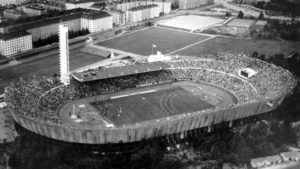 Jul 19-Aug 3: The Summer Olympic Games open in Helsinki. The Finnish capital had been selected to host the 1940 games, which were cancelled due to World War II. The Soviet Union, the People’s Republic of China, Indonesia, Israel, Thailand, and Saarland make their Olympic debuts. The Republic of China (Taiwan) pulls out in protest over Communist China’s participation.
Jul 19-Aug 3: The Summer Olympic Games open in Helsinki. The Finnish capital had been selected to host the 1940 games, which were cancelled due to World War II. The Soviet Union, the People’s Republic of China, Indonesia, Israel, Thailand, and Saarland make their Olympic debuts. The Republic of China (Taiwan) pulls out in protest over Communist China’s participation.
![]()
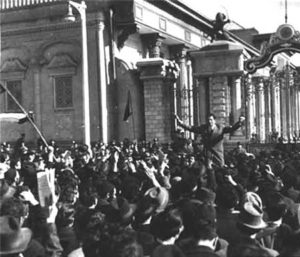 Jul 19: Street demonstrations and violent riots break out in Teheran and other cities and towns as supporters of former Iranian Prime Minister Mohammed Mossadegh protest the appointment of Ahmad Qavam os Saltaneh as Prime Minister. In Abadan, home to the massive Anglo-Iranian Oil Company refinery that was taken over by the government, striking workers have taken weapons and armored cars away from the troops. Ayatollah Abol-Ghasem Kashani has also denounces the new Premier as “a person who was reared in the arms of monarchy and despotism, and whose life is full of treason.”
Jul 19: Street demonstrations and violent riots break out in Teheran and other cities and towns as supporters of former Iranian Prime Minister Mohammed Mossadegh protest the appointment of Ahmad Qavam os Saltaneh as Prime Minister. In Abadan, home to the massive Anglo-Iranian Oil Company refinery that was taken over by the government, striking workers have taken weapons and armored cars away from the troops. Ayatollah Abol-Ghasem Kashani has also denounces the new Premier as “a person who was reared in the arms of monarchy and despotism, and whose life is full of treason.”
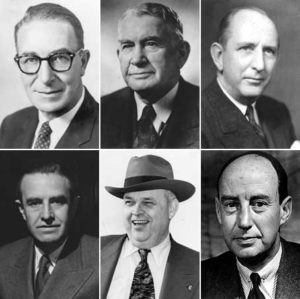
![]() Jul 21: A fractious Democratic Party meets in Chicago for its national convention to choose its presidential nominee. The convention opens with no clear path to a nomination for anyone. There are five declared aspirants. If there is a front runner, it’s Estes Kefauer. He enjoys labor’s backing, and he also has broad popular support due to his well-publicized hearings on organized crime in 1950 and 1951. But his willingness to go after corrupt politicians of either party created a lot of enemies among big city bosses. Vice President Alben Barkley is running strongly, but his age — he’s 74 — and his backing from conservatives is anathema to organized labor. But Barkley is counting on additional Southern support if their favorite candidate, Georgia Sen. Richard B. Russell, can’t get any traction. Russell, of course, is utterly unacceptable to northern delegates who despise his segregationist stance. Former Commerce Secretary Averell Harriman enjoys support from labor and Truman supporters, both of which works against the New Yorker among conservative and southern Democrats. The fifth candidate, Oklahoma Sen. Robert Kerr, has very little support beyond Oklahoma and Texas. Meanwhile, the party’s consensus favorite, Illinois governor Adlai Stevenson, repeatedly insists he’s not a candidate. Stevenson gives the welcoming address as host governor, but he is made to wait at least five minutes after his introduction when the convention erupts into a demonstration typically reserved for a candidate.
Jul 21: A fractious Democratic Party meets in Chicago for its national convention to choose its presidential nominee. The convention opens with no clear path to a nomination for anyone. There are five declared aspirants. If there is a front runner, it’s Estes Kefauer. He enjoys labor’s backing, and he also has broad popular support due to his well-publicized hearings on organized crime in 1950 and 1951. But his willingness to go after corrupt politicians of either party created a lot of enemies among big city bosses. Vice President Alben Barkley is running strongly, but his age — he’s 74 — and his backing from conservatives is anathema to organized labor. But Barkley is counting on additional Southern support if their favorite candidate, Georgia Sen. Richard B. Russell, can’t get any traction. Russell, of course, is utterly unacceptable to northern delegates who despise his segregationist stance. Former Commerce Secretary Averell Harriman enjoys support from labor and Truman supporters, both of which works against the New Yorker among conservative and southern Democrats. The fifth candidate, Oklahoma Sen. Robert Kerr, has very little support beyond Oklahoma and Texas. Meanwhile, the party’s consensus favorite, Illinois governor Adlai Stevenson, repeatedly insists he’s not a candidate. Stevenson gives the welcoming address as host governor, but he is made to wait at least five minutes after his introduction when the convention erupts into a demonstration typically reserved for a candidate.
![]()
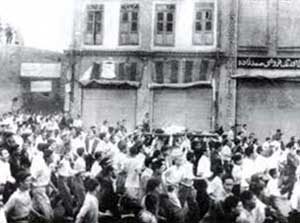 Jul 21: Iranian Prime Minister Ahmad Qavam os Saltaneh resigns after three days of intense riots and strikes by thousands of supporters of former Prime Minister Mohammed Mossadegh. Qavam’s resignation comes after the Majlis refuses to back his request for emergency military and police powers to quell the violence.
Jul 21: Iranian Prime Minister Ahmad Qavam os Saltaneh resigns after three days of intense riots and strikes by thousands of supporters of former Prime Minister Mohammed Mossadegh. Qavam’s resignation comes after the Majlis refuses to back his request for emergency military and police powers to quell the violence.
![]() Jul 22: Vice President Alven Barkley, until yesterday a strong candidate for the Democratic presidential nomination, withdraws from the race with a bitter denunciation of the “self-appointed” labor leaders who refused to endorse him. He does not name a preference for any of the other candidates, which strengthens the hand of the draft-Stephenson movement. President Truman, who is a convention delegate but is not present, gives instructions to his proxy that suggests Truman’s preference for Stevenson. Indiana Gov. Henry Schricker says he will place Stevenson’s name in nomination, and that he has Stephenson’s personal assurance that he would accept if nominated. Tennessee Sen. Estes Kefauver and former Commerce Secretary Averell Harriman meet to try to put together a liberal coalition to block Stevenson’s nomination. Meanwhile, the convention forces through a mandatory loyalty pledge requiring all of the state delegations (meaning, specifically, the South) refrain from keeping the convention’s nominee off of their state’s November ballot, regardless of whether the nominee is acceptable to them or not. This is a move to prevent what happened in 1948 when several Southern states used the Democratic Party’s position, name and symbols to run South Carolina Gov. Strom Thurmond as a Dixicrat candidate against Truman.
Jul 22: Vice President Alven Barkley, until yesterday a strong candidate for the Democratic presidential nomination, withdraws from the race with a bitter denunciation of the “self-appointed” labor leaders who refused to endorse him. He does not name a preference for any of the other candidates, which strengthens the hand of the draft-Stephenson movement. President Truman, who is a convention delegate but is not present, gives instructions to his proxy that suggests Truman’s preference for Stevenson. Indiana Gov. Henry Schricker says he will place Stevenson’s name in nomination, and that he has Stephenson’s personal assurance that he would accept if nominated. Tennessee Sen. Estes Kefauver and former Commerce Secretary Averell Harriman meet to try to put together a liberal coalition to block Stevenson’s nomination. Meanwhile, the convention forces through a mandatory loyalty pledge requiring all of the state delegations (meaning, specifically, the South) refrain from keeping the convention’s nominee off of their state’s November ballot, regardless of whether the nominee is acceptable to them or not. This is a move to prevent what happened in 1948 when several Southern states used the Democratic Party’s position, name and symbols to run South Carolina Gov. Strom Thurmond as a Dixicrat candidate against Truman.
![]()
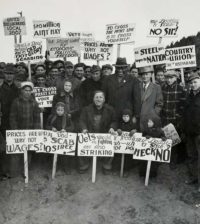 Jul 22: Steel shortages stemming from the fifty-one-day-old strike has forced the Army to shut down its largest shell-making plant. President Truman is facing pressure from two fronts: from defense officials worried about arms and ammunition shortages, and from farmers worried about the lack of tin cans forcing them to destroy fruits and vegetables set to be harvested in August.
Jul 22: Steel shortages stemming from the fifty-one-day-old strike has forced the Army to shut down its largest shell-making plant. President Truman is facing pressure from two fronts: from defense officials worried about arms and ammunition shortages, and from farmers worried about the lack of tin cans forcing them to destroy fruits and vegetables set to be harvested in August.
![]()
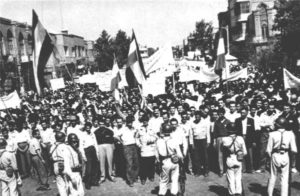 Jul 22: Former Iranian Prime Minister Mohammed Mossadegh is back in office, now more powerful than ever. To induce Mossadegh to accept the Premiership and end the violence, the Shah has little choice to accede to Mossaegh’s demand for control of the military, the last major power still held by the Shah. It is now all but certain that the Majlis will give Mossadegh the dictatorial powers that he demanded a week ago. The Majlis is also poised to approve a measure confiscating the properties of former Prime Minister Ahmad Qavam os Saltaneh, who was in power for only four days. Over the next few days, Mossadegh will transfer the Shah’s lands back to the State, force the Shah’s twin sister, Princess Ashraf, to leave the country, and forbid the Shah from communicating directly with foreign diplomats.These events will be remembered as the 30th Tir uprising, according to the date on the Iranian calendar.
Jul 22: Former Iranian Prime Minister Mohammed Mossadegh is back in office, now more powerful than ever. To induce Mossadegh to accept the Premiership and end the violence, the Shah has little choice to accede to Mossaegh’s demand for control of the military, the last major power still held by the Shah. It is now all but certain that the Majlis will give Mossadegh the dictatorial powers that he demanded a week ago. The Majlis is also poised to approve a measure confiscating the properties of former Prime Minister Ahmad Qavam os Saltaneh, who was in power for only four days. Over the next few days, Mossadegh will transfer the Shah’s lands back to the State, force the Shah’s twin sister, Princess Ashraf, to leave the country, and forbid the Shah from communicating directly with foreign diplomats.These events will be remembered as the 30th Tir uprising, according to the date on the Iranian calendar.
![]()
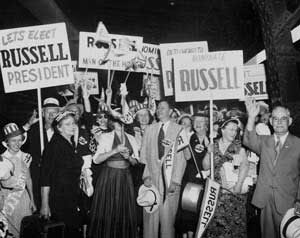 Jul 23: Northern and southern Democratic party leaders reach a compromise over the party loyalty pledge allowing Southern Democrats to use “every honorable means” to place the convention’s nominee onto state ballot for November, subject to state laws. Southerners who are bound by state law to make no binding commitments will be allowed to take the pledge now that it is subject to state law. Three southern states — South Carolina, Virginia, and Louisiana — still refuse to take the diluted pledge. They will be barred from voting for the nominations, but the party allows them to remain at their places in the hall as spectators. This cuts the necessary number of votes to nominate a Presidential candidate from 616 to 583½. It also profoundly damages Georgia Sen. Richard B. Russell’s already slim chances of being nominated.
Jul 23: Northern and southern Democratic party leaders reach a compromise over the party loyalty pledge allowing Southern Democrats to use “every honorable means” to place the convention’s nominee onto state ballot for November, subject to state laws. Southerners who are bound by state law to make no binding commitments will be allowed to take the pledge now that it is subject to state law. Three southern states — South Carolina, Virginia, and Louisiana — still refuse to take the diluted pledge. They will be barred from voting for the nominations, but the party allows them to remain at their places in the hall as spectators. This cuts the necessary number of votes to nominate a Presidential candidate from 616 to 583½. It also profoundly damages Georgia Sen. Richard B. Russell’s already slim chances of being nominated.
![]() Jul 23: The European Coal and Steel Community is established. The pact will become one of the forerunners of the European Economic Community in 1958.
Jul 23: The European Coal and Steel Community is established. The pact will become one of the forerunners of the European Economic Community in 1958.
![]() Jul 23: Egyptian premier Ahmed Naguib El Hilaly is overthrown in a military coup. King Farouk remains in the royal palace, but his role in the government is uncertain.
Jul 23: Egyptian premier Ahmed Naguib El Hilaly is overthrown in a military coup. King Farouk remains in the royal palace, but his role in the government is uncertain.
![]() Jul 24: The fifty-three day steel strike that has been putting the brakes on the economy is finally settled at a White House meeting. The settlement come after President Truman warned the unions and industry leaders to strike a settlement within twenty-four hours “or else.” That “or else” was the possibility that the Army may take over those steel mills working on defense contracts under the Selective Service Act of 1948. The order to 600,000 striking workers to report to work will go out late on July 26, and it is expected that steel will begin emerging from the shuttered factories three or four days after that.
Jul 24: The fifty-three day steel strike that has been putting the brakes on the economy is finally settled at a White House meeting. The settlement come after President Truman warned the unions and industry leaders to strike a settlement within twenty-four hours “or else.” That “or else” was the possibility that the Army may take over those steel mills working on defense contracts under the Selective Service Act of 1948. The order to 600,000 striking workers to report to work will go out late on July 26, and it is expected that steel will begin emerging from the shuttered factories three or four days after that.
![]() Jul 24: The Democratic National Convention spends most of the day hearing nominating speeches for eleven candidates for President. There were twelve nominating speeches (including two for Illinois Gov. Adlai Stevenson) and about thirty seconding speeches. During the steady flow of speeches, the convention pauses to consider motions to restore full voting rights to the delegations from South Carolina, Virginia and Louisiana, despite those delegates’ refusal to take a watered-down loyalty pledge. The convention, at first, rejects the proposal, but delegates begin switching their votes when Stevenson makes it known that he wants a full, unified convention.
Jul 24: The Democratic National Convention spends most of the day hearing nominating speeches for eleven candidates for President. There were twelve nominating speeches (including two for Illinois Gov. Adlai Stevenson) and about thirty seconding speeches. During the steady flow of speeches, the convention pauses to consider motions to restore full voting rights to the delegations from South Carolina, Virginia and Louisiana, despite those delegates’ refusal to take a watered-down loyalty pledge. The convention, at first, rejects the proposal, but delegates begin switching their votes when Stevenson makes it known that he wants a full, unified convention.
![]()
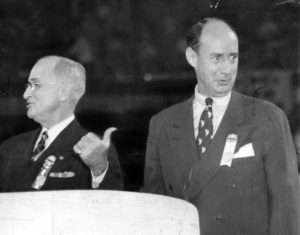 Jul 25: The Democratic National Convention nominates Gov. Adlai Stevenson for president on the third ballot. Tennessee Sen. Estes Kefauver took the lead on the first ballot with 340 votes, far short of the 616 needed to win. Stevenson came in second with 273 votes, Georgia Sen. Richard B. Russel was third with 273 votes, former Commerce Secretary Averell Harriman was fourth with 123 ½ votes, and the remaining 159½ votes were spread among ten other names. Oklahoma Sen. Robert Kerr, who only got 65 votes, dropped out. For the second ballot, Kefauver remained in the lead, with 362½ votes to Stevenson’s 324½, Russell’s 294 and Harriman’s 121. When Harriman saw that he wasn’t getting anywhere and that the Southern delegates were swinging to Kefauver, he decided to yield to the inevitable. He also felt that it was more important that the liberal wing of the party putting Stevenson over the top and not the Southern wing. For the third ballot, Stevenson was on top with 613 votes — three votes short of the needed 616 — followed by Kefouber’s 275½ and Russell’s 261. Before the balloting was closed however, Sen. Kefauver rose to announce that Tennessee was changing its votes to Stevenson. The session ends with President Truman introducing the new Democratic nominee to the cheering convention. This is the first genuine draft of a presidential nominee since the Republicans demanded and got James A. Garfield in 1880. And it will be the last time a presidential nomination requires more than one ballot.
Jul 25: The Democratic National Convention nominates Gov. Adlai Stevenson for president on the third ballot. Tennessee Sen. Estes Kefauver took the lead on the first ballot with 340 votes, far short of the 616 needed to win. Stevenson came in second with 273 votes, Georgia Sen. Richard B. Russel was third with 273 votes, former Commerce Secretary Averell Harriman was fourth with 123 ½ votes, and the remaining 159½ votes were spread among ten other names. Oklahoma Sen. Robert Kerr, who only got 65 votes, dropped out. For the second ballot, Kefauver remained in the lead, with 362½ votes to Stevenson’s 324½, Russell’s 294 and Harriman’s 121. When Harriman saw that he wasn’t getting anywhere and that the Southern delegates were swinging to Kefauver, he decided to yield to the inevitable. He also felt that it was more important that the liberal wing of the party putting Stevenson over the top and not the Southern wing. For the third ballot, Stevenson was on top with 613 votes — three votes short of the needed 616 — followed by Kefouber’s 275½ and Russell’s 261. Before the balloting was closed however, Sen. Kefauver rose to announce that Tennessee was changing its votes to Stevenson. The session ends with President Truman introducing the new Democratic nominee to the cheering convention. This is the first genuine draft of a presidential nominee since the Republicans demanded and got James A. Garfield in 1880. And it will be the last time a presidential nomination requires more than one ballot.
![]() Jul 25: Puerto Rico becomes a self-governing commonwealth of the U.S.
Jul 25: Puerto Rico becomes a self-governing commonwealth of the U.S.
![]()
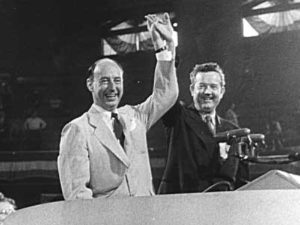 Jul 26: Democratic Presidential nominee Gov. Adlai Stevenson offers an olive branch to the South by picking Alabama Sen. John J. Sparkman as his running mate.
Jul 26: Democratic Presidential nominee Gov. Adlai Stevenson offers an olive branch to the South by picking Alabama Sen. John J. Sparkman as his running mate.
![]() Jul 26: U.N. truce negotiators angrily walk out of the still deadlocked armistice talks in Panmunjom and say they will return in a week for further discussions. The walkout occurs after the Chinese and North Koreans subjected the U.N. delegates to a forty-nine-minute barrage of false propaganda charges. “They had it coming to them,” says U.N. senior delegate Gen. William J. Harrison, Jr., who says he is “fed up with the utter hypocrisy” of the Communist delegates.
Jul 26: U.N. truce negotiators angrily walk out of the still deadlocked armistice talks in Panmunjom and say they will return in a week for further discussions. The walkout occurs after the Chinese and North Koreans subjected the U.N. delegates to a forty-nine-minute barrage of false propaganda charges. “They had it coming to them,” says U.N. senior delegate Gen. William J. Harrison, Jr., who says he is “fed up with the utter hypocrisy” of the Communist delegates.
![]() Jul 26: Three days after a military coup, Egypt’s King Farouk abdicates and goes into exile in Italy. The Cabinet proclaims Farouk’s seven-month-old son, Crown Prince Ahmed Fuad, as King Fuad II of Egypt and the Sudan.
Jul 26: Three days after a military coup, Egypt’s King Farouk abdicates and goes into exile in Italy. The Cabinet proclaims Farouk’s seven-month-old son, Crown Prince Ahmed Fuad, as King Fuad II of Egypt and the Sudan.
![]()
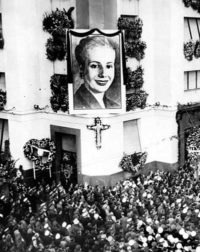 Jul 26: Eva Perón, Argentine First Lady and former actress, dies of cancer at the age of 33.
Jul 26: Eva Perón, Argentine First Lady and former actress, dies of cancer at the age of 33.
![]() Jul 28: Sen. Brien McMahon (D-CT), who had withdrawn as a candidate for the Democratic presidential nomination just as the Democratic National Convention got under way in Chicago, dies of lung cancer at the age of 48.
Jul 28: Sen. Brien McMahon (D-CT), who had withdrawn as a candidate for the Democratic presidential nomination just as the Democratic National Convention got under way in Chicago, dies of lung cancer at the age of 48.
![]() Jul 29: About 200,000 East Germans flood into West Berlin when rumors circulate that East Germany will close off the border between East Germany and West Berlin on August 1.
Jul 29: About 200,000 East Germans flood into West Berlin when rumors circulate that East Germany will close off the border between East Germany and West Berlin on August 1.
![]() Jul 31: Sixty-three American B-29 Superfortresses pound a large aluminum plant in North Korea just a few miles from its border with China. The bombers batter the plant for more than three hours in the largest air strike against a single military target of the Korean War. The raid, carried out on a moonless, cloudy night, is completed without the loss of a single aircraft.
Jul 31: Sixty-three American B-29 Superfortresses pound a large aluminum plant in North Korea just a few miles from its border with China. The bombers batter the plant for more than three hours in the largest air strike against a single military target of the Korean War. The raid, carried out on a moonless, cloudy night, is completed without the loss of a single aircraft.
![]() Jul 31: As expected, the Iranian parliament pushes through Prime Minister Mohammed Mossadegh’s single article bill giving him the power to legislate by decree for the next six months. It now goes to the Senate, where quick passage is expected. The bill does not put the Majlis entirely out of business. It will still continue to meet, pass legislation, and approve Mossadegh’s moves whenever he feels he needs their vote of confidence to continue moving forward. But this bill, combined with Mossadegh’s wresting control of the army from the Shah, does allow Mossadegh to rule by decree a virtual dictator.
Jul 31: As expected, the Iranian parliament pushes through Prime Minister Mohammed Mossadegh’s single article bill giving him the power to legislate by decree for the next six months. It now goes to the Senate, where quick passage is expected. The bill does not put the Majlis entirely out of business. It will still continue to meet, pass legislation, and approve Mossadegh’s moves whenever he feels he needs their vote of confidence to continue moving forward. But this bill, combined with Mossadegh’s wresting control of the army from the Shah, does allow Mossadegh to rule by decree a virtual dictator.
![[Emphasis Mine]](http://jimburroway.com/wp-content/uploads/2018/01/DoBFounders.jpg)
